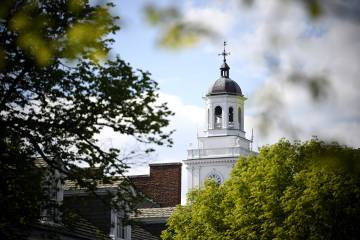The Behavioral Health Crisis Support Team at Johns Hopkins University, which pairs licensed clinicians who have crisis response expertise with public safety personnel to assist people experiencing behavioral health crises, has completed a one-year pilot phase at the university's Homewood campus and is expanding, university leaders announced today.
As of this week, the group's service area includes Homewood and the Peabody campus in Mount Vernon, and planning is under way for an expansion to East Baltimore in 2023.
Additionally, access to BHCST clinicians has been expanded with the launch of a new phone line at 410-516-WELL (9355); the line is staffed 24 hours a day, 365 days a year. In the event a clinician is assisting someone else and is unavailable, the caller will be notified that their call is being redirected to public safety for assistance in locating a clinician.
"Public safety and student health leaders have been encouraged by the initial success of the program and hope that the access line—along with the new university marketing campaign—will help educate the community about the range of behavioral health resources available at JHU and make it easier for them reach BHCST clinicians for assistance." Kevin Shollenberger, vice provost for student health and well-being, and Branville Bard Jr., vice president for public safety at Johns Hopkins, wrote in a message to the university community today.
The BHCST is part of broader, multi-faceted strategy to ensure the safety and well-being of the Hopkins community. Prior to launching the program, university leadership conducted an assessment of calls into Public Safety and found that approximately one-third of those calls pertained to behavioral health issues. That data informed the decision to develop the BHCST, in consultation with mental health experts, with the hope of more effectively and appropriately managing calls related to behavioral health crises by deploying behavioral health clinicians in person alongside public safety personnel.
In this co-responder model, a clinician and a public safety officer travel together to calls with a behavioral health component, such as requests to check on someone's well-being or reports of someone with suicidal ideation. Public safety's role is to ensure the safety of the environment while the clinician engages with the person in distress. The team serves Johns Hopkins students, faculty, staff, and our unaffiliated Baltimore neighbors.
Since the program launched at the Homewood campus—from Oct. 27, 2021, through Sept. 29, 2022—the BHCST has responded to 85 calls to assist Johns Hopkins students and three calls to assist community members. Clinicians have responded in person, conducted safety assessments, and provided compassionate listening, validation, and de-escalation. They also have helped those in distress plan next steps for receiving support and follow-up services.
In planning to expand to Peabody, the university consulted the BHCST Advisory Committee and met with many Peabody community members, including students, faculty, residence life staff, administrators, and representatives from local community organizations to answer questions and provide information about the team and how it is mobilized.
More information about the Behavioral Health Crisis Support Team is available on the university's public safety website. Feedback and questions should be directed to bhresponse@jhu.edu.
Posted in University News









